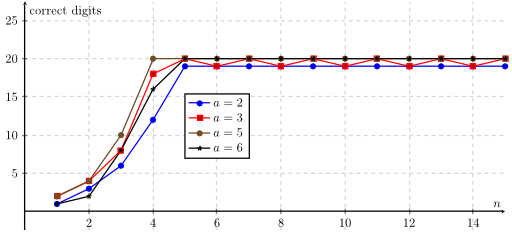Suppose you have an equation like this:
\(x^2 = a, \;\;\;\; a \in \mathbb{R}_{\geq 0}\)
Your task is to compute the solution \(x \in \mathbb{R}_{\geq 0}\).
How do you solve this algorithmically?
Input and output
Write a program that takes two parameters \(a, n \in \mathbb{N}_{\geq 1}\):
- $a$: The number you should take the square root of. $a$ is not bigger than 65535. To make this a little bit simpler, you can also assume that $a$ is an integer.
- $n$: Number of iterations you may use
Your program should output exactly one positive floating point number. The decimal separator is a point. At the end of the number should be a newline character \n.
Reference code
// Thanks to http://stackoverflow.com/a/15363123/562769
#include <stdio.h>
#include <gmp.h>
int main(int argc, char *argv[]) {
mpf_t res, a;
mpf_set_default_prec(1000000); // Increase this number.
mpf_init(res);
mpf_init(a);
mpf_set_str(a, "2", 10);
mpf_sqrt (res, a);
gmp_printf("%.1000Ff\n\n", res); // Increase this number.
return 0;
}
You need GMP (libgmp-dev) to compile this.
Compile it like this:
gcc sqrt-reference.c -lgmp -lm -O0 -g3 -o reference.out
This is the script I use to get the number of correct digits:
#!/usr/bin/env python
# -*- coding: utf-8 -*-
def getScore(program, a, n):
import os
os.system("./reference.out " + str(a) + " > reference.txt")
os.system("./" + program + " " + str(a) + " " + str(n) + " > result.txt")
f = open("reference.txt", "r")
reference = f.read()
f.close()
f = open("result.txt", "r")
result = f.read()
f.close()
points = 0
areEqual = True
while reference[points] != "\n" and result[points] != "\n":
if reference[points] == result[points]:
points += 1
else:
break
if points >= 2:
points -= 1 # decimal point
return points
if __name__ == "__main__":
from argparse import ArgumentParser
parser = ArgumentParser()
# Add more options if you like
parser.add_argument(
"-p",
"--program",
dest="program",
help="your program",
metavar="FILE",
required=True,
)
parser.add_argument(
"-a", metavar="A", type=int, required=True, help="calculate squre root of a"
)
parser.add_argument(
"-n", metavar="N", type=int, required=True, help="maximum n iterations"
)
args = parser.parse_args()
print(
"Points for a=%i and n=%i: %i"
% (args.a, args.n, getScore(args.program, args.a, args.n))
)
Newton's method
How should be choose the initial value? I thought \(\frac{a}{2}\) could be ok. In a good implementation you'll probably do this with a lookup table.
With long double:
#include <iostream>
#include <cmath>
using namespace std;
long double newton(int a, int n) {
long double x = ((long double)a)/2;
for (int i=0; i<n; i++) {
x = x - (x*x - a)/(2*x);
}
return x;
}
int main(int argc, char *argv[]) {
if (argc != 3) {
cout << "Please enter exactly two arguments." << endl;
return 1;
}
int a = atoi(argv[1]);
int n = atoi(argv[2]);
printf("%.80Lf\n", newton(a, n));
return 0;
}
I failed to convert this to a version that uses GMP :-/
But it converges quite fast:

Exponential identity
According to Wikipedia (Source: Methods of computing square roots) many calculators use the following identity:
\(\displaystyle \sqrt{a} = e^{\frac{1}{2}\ln a}\)
But to calculate this, you need to be able to calculate \(e^x\) for \(x \in \mathbb{R}_{\geq 0}\) and \(\ln(a)\) for \(a \in \mathbb{R}_{\geq 0}\).
I've used the definition of \(e^x\) to calculate \(e^x\): \(\displaystyle e^x := \sum_{i = 0}^\infty \frac{x^i}{i!}\)
and:
\(\displaystyle \ln(1+x) =- \sum_{k=0}^\infty \frac{(-x)^{k+1}}{k+1}\)
So I gave it a try:
#include <iostream>
#include <cmath>
using namespace std;
long double ln(int S, int n) {
long double tmp = S - 1;
long double result = tmp;
long double sign = 1.0;
for (int i=2; i<n/2; i++) {
tmp *= (S-1);
sign *= -1;
result += sign*tmp/i;
}
return result;
}
long double e(long double x, int n) {
long double numerator = 1;
long double denominator = 1;
long double result = 1;
for (int i=1; i<n/2; i++) {
numerator *= x;
denominator *= i;
result += numerator/denominator;
}
return result;
}
long double sqrt(int a, int n) {
return e(ln(a, n)*0.5, n);
}
int main(int argc, char *argv[]) {
if (argc != 3) {
cout << "Please enter exactly two arguments." << endl;
return 1;
}
int a = atoi(argv[1]);
int n = atoi(argv[2]);
printf("%.80Lf\n", sqrt(a, n));
return 0;
}
This converges VERY slow: For \(a = 2\)
- $n=1$: 1 digit correct
- $n=10$: 1 digit correct
- $n=100$: 2 digits correct
- $n=1000$: 4 digit correct
- $n=10,000$: 5 digit correct
- $n=100,000$: 5 digit correct
- $n=1,000,000$: 6 digit correct
Ok, lets take a better Taylor series for calculating \(e^x\): \(\displaystyle e^x = \sum_{k=0}^\infty \frac{x^{-1+2 k} (2 \cdot k+x)}{(2\cdot k)!}\)
This didn't change anything! I'm very surprised ... as I've calculated \(\pi\) for another article, changing the series to something similar improved the speed of convergence drastically.
See also
- StackOverflow: How does the computer calculate Square roots?
- Intel® 64 and IA-32 Architectures Software Developer’s Manual: FSQRT, SQRTPS, SQRTSS
- Source code of this article
Feel free to add a program that calculates square roots. When they are interesting, I'll probably add them to this article.